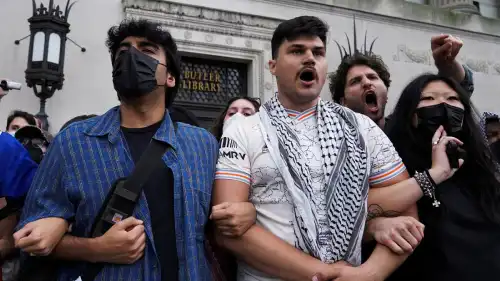Clashes Erupt Between Pro-Palestinian Protesters and Security at Columbia University

Clashes Erupt Between Pro-Palestinian Protesters and Security at Columbia University
On May 7, 2025, Columbia University witnessed intense scenes. Pro-Palestinian protesters clashed with security forces after occupying the historic Butler Library. This protest, organized by Columbia University Apartheid Divest (CUAD), demanded that the university cut financial ties with companies allegedly involved in the Israeli military campaign in Gaza.
Protest Begins Inside Butler Library
The protest started as a peaceful sit-in. However, tensions quickly escalated. Demonstrators entered Butler Library, waving Palestinian flags and hanging banners. Some renamed the site the “Basel Al-Araj Popular University,” after a Palestinian activist killed by Israeli forces in 2017.
Although initially non-violent, the group refused to leave. Some wrote graffiti, including threatening phrases like “Columbia will burn.” As a result, the university responded with urgency.
University Calls in NYPD
Due to rising concerns over student safety and final exam disruptions, Columbia officials contacted the New York Police Department (NYPD). Officers entered the building and gave protesters a chance to leave peacefully. Many refused.
Eventually, about 75 people were arrested. Two campus security guards suffered injuries during the confrontation. According to officials, some protesters resisted forcefully.
Administration Defends Its Actions
Claire Shipman, Columbia’s acting president, defended the call to involve the police. She emphasized the need to maintain safety and order on campus. In her statement, she said the university supports free speech—but not when it violates policy or endangers others.
She added that the university had warned students multiple times to follow rules. Despite this, many protesters broke those rules.
Political Leaders React Strongly
Local and national leaders also responded. New York Mayor Eric Adams and Governor Kathy Hochul supported the university’s decision. They said public safety must come first.
U.S. Secretary of State Marco Rubio went further. He called for foreign student protesters to have their visas reviewed or revoked, calling them “pro-Hamas thugs.” This controversial statement drew both support and criticism.
Federal Pressure Mounts
Columbia’s actions came amid federal pressure. The Trump administration has threatened to pull $400 million in federal funding from the university. The government claims Columbia failed to control antisemitic speech and harassment on campus.
To comply, Columbia tightened its policies. New rules now restrict protests and require student ID checks. Protesters can no longer wear face coverings like masks or keffiyehs.
Not everyone agrees with these changes. Some professors and students accuse the administration of surrendering to political pressure. They argue that free expression is essential at a university.
Resignation and New Leadership
This protest comes weeks after former university president Katrina Armstrong resigned. She faced heavy criticism for how the university handled earlier protests. In response, Claire Shipman stepped in as interim president.
So far, her leadership has focused on calming tensions while addressing federal demands. Still, balancing both sides remains difficult.
Protests Spread to Other Campuses
Columbia’s protest is not an isolated case. Across the U.S., students at universities like NYU, Yale, and Harvard have launched similar movements. They call for divestment from companies linked to Israel’s actions in Gaza.
Many protests are peaceful. But some, like Columbia’s, have led to arrests and confrontations. The message is clear: students want their voices heard, especially on global human rights issues.
Debates Over Free Speech and Safety
These protests have ignited national conversations. Should universities allow students to protest freely? Or should they prioritize safety and law enforcement?
Supporters of the protesters say student voices are critical. They believe universities should support activism, not punish it. On the other hand, opponents worry about antisemitism, hate speech, and violence.
Looking Ahead
The situation at Columbia remains tense. While classes continue, protests are likely to return. Students, faculty, and administrators must now find a way to move forward—together.
This protest is more than a campus issue. It reflects deep political, ethical, and humanitarian concerns. As the Israel-Gaza war continues, so too will these protests. What happens at Columbia could shape policies at universities nationwide.






